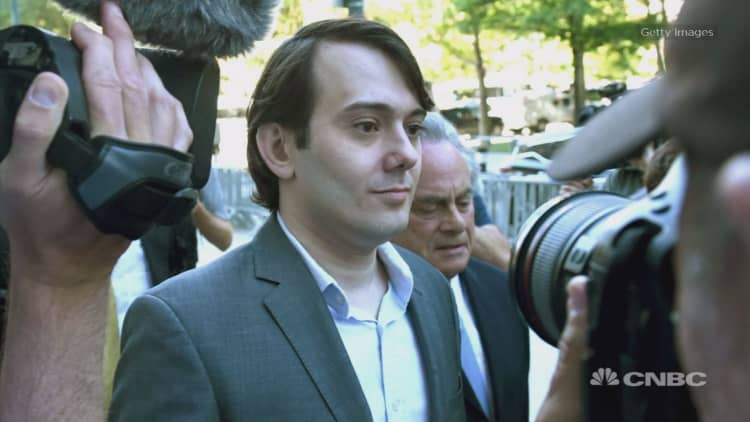
Lawyers for "pharma bro" Martin Shkreli are asking a federal judge to sentence the convicted fraudster to only somewhere between 12 and 18 months in prison, followed by court-mandated therapy and 2,000 hours of community service for his crimes.
But that range is well below what likely could easily be a recommended prison term for Shkreli of a decade or more under federal sentencing guidelines.
However, the judge in the case will have broad leeway to give him the sentence she deems fit when the 34-year-old Shkreli appears in Brooklyn, New York, federal court March 9.
In a court filing late Tuesday, Shkreli's lawyers called him a "very unique defendant" who deserves a big break.
"Martin is comprised of more than his criminal conduct," his lawyers wrote in that filing, in which they detailed what they said are various philanthropic and altruistic efforts by the perpetually controversial Shkreli.
"Specifically, he is a kind, caring and generous person who uses his time and effort to help those in need. If not warehoused in prison, Martin could literally save lives."
The filings say Shkreli had devoted significant amounts of time and money to researching treatments for rare diseases, personally helped "strangers and friends with necessary funds for medical procedures," and mentored others.
The filing contends that Shkreli's "problem" that led to his conviction was not greed for himself, but the fact that he was "so driven to make" investors money "that he could not bring himself to admit failure" when his stock trading strategies failed.
"Although Martin was convicted of fraud, he was not looking to hurt or damage his investors like many other investors," the lawyers wrote. "He sincerely believed he could make them money if he worked hard enough.'
The attorneys acknowledged Shkreli's "sometimes poor judgment" — the examples of which are legion — but argued that "the answer to these concerns" is not a long prison sentence, but rather "therapy and counseling."
Many sections of the filing are blacked out from public view and seem to refer to personal details about Shkreli and other people.
Shkreli was convicted in August of three counts of securities fraud related to his operation of two hedge funds and a drug company he founded, Retrophin.
Prosecutors in their case at trial detailed how he had repeatedly misled investors about details and the performance of those funds, and then used assets from Retrophin to pay them back for what they had invested — and then some.
Shkreli's conviction in August came after two years of inflammatory and abrasive public conduct.
That included raising the price of a drug used by AIDS patients by more than 5,000 percent, making a churlish appearance before a congressional committee, trolling various people with insulting social media posts and getting into a high-profile feud with a member of the hip-hop group Wu-Tang Clan.
While free on a $5 million release bond after his trial, Shkreli offered, in what he later said was an ill-conceived stunt, his Facebook followers $5,000 for each strand of hair they managed to
obtain from Hillary Clinton.
Judge Kiyo Matsumoto revoked his bond for that offer, finding that Shkreli's actions represented a danger to the public.
Earlier this week, Matsumoto ruled that for the purposes of sentencing, at least, the amount of loss from Shkreli's crimes was $10.4 million. The judge has yet to rule on how much money Shkreli should forfeit to the federal government.
Defense lawyers have argued that there was effectively no loss because the investors actually ended up making more than what they had originally invested. But Matsumoto said Shkreli should get no credit for that because he only started making investors whole after red flags were raised about his suspected fraud.
Under federal sentencing guidelines, monetary loss plays a major role in calculating a recommended term of incarceration.
Matsumoto's ruling about the loss in the case means that those guidelines will recommend a very long prison term for Shkreli, much longer than the 18-month maximum requested by his legal team.
Federal prosecutors are due to make their own recommendations for Shkreli's sentence early next week.
WATCH: Co-worker says Shkreli 'mentally unstable'



